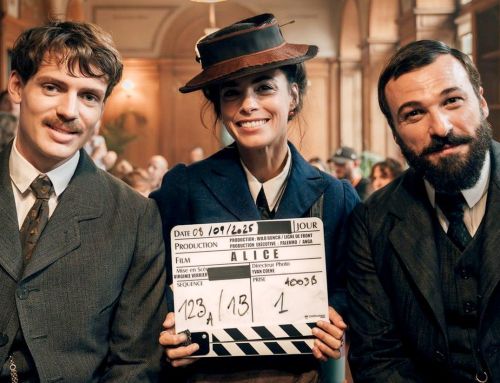CANNES DAY 6 – XENIA
My knowledge of Greek cinema is imperfect, I admit–but am I alone? Greek cinema has historically suffered from a lack of promotional support abroad, which leaves moviegoers with scant information about the Greek canon. I remember watching Yorgos Lanthimos’s “Dogtooth” in Cannes a few years ago and feeling unnerved but also strangely delighted. Lanthimos took risks by putting characters that were not likable in a situation so unusual, and extreme, that their vulnerability made them compelling.
I’m still groping through the Angelopoulos cannon to find my treasure and I’m pretty sure that Costa-Gavras cannot be considered a Greek filmmaker anymore. Michael Cacoyannis’s “Zorba the Greek” remains a reference, one which should not be overlooked.
Athens-born Panos H. Koutras was first noticed in 2000 with the off-kilter “Attack of the Giant Moussaka,” a cheeky and hilarious spoof of disaster movies that claims direct lineage to John Waters and Pedro Almodovar. In 2009’s “Strella” a man comes out of prison and visits a prostitute who he falls in love with, only to have his past catch up with him. The film has been noted as being Koutras’s best work. He’s been forging ahead since, and this in spite of enormous difficulties finding funds to complete his films.

“Attack of the giant moussaka”
Koutras’s film “Xenia” (123 minutes) was screened as part of the Un Certain Regard program today. In an interview he’s described it as a kind of farewell to his youth. “As I approach my fifties I thought, the time has come to make my teenage movie,” he said. Previous themes like the quest for identity and brotherhood are also present here. “I deeply believe in brotherly love,” he states. “It’s a very important love, where I’m concerned.”
“Xenia” turned out to be slightly predictable but Koutras wisely explores the rough economic conditions of a Greece that’s choking under the weight of austerity measures with a climate of xenophobia and homophobia that the two brothers are confronted with.
Trending the Cannes Festival on Twitter – Lock #SCannes2014 for our daily updates
He professes an admiration for the films of Fassbinder, Bresson, Sirk and Minelli, and knows his three Rs: Ray, Renoir, and Rossellini. But he also cites the foreign TV series of the sixties and seventies he grew up with as an influence.

Xenia
In “Xenia” two brothers, Danny, sixteen, and Odysseas, eighteen, embark on a journey from Crete to Thessaloniki to find their father after their Albanian mother passes away. Their father abandoned them when they were very young. Foreigners in their own country, they are determined to find their father and be recognized by him officially in order to obtain Greek citizenship.
In the film’s subplot the brothers prepare for an appearance in a talent show, with its promise of a better life. As the two brothers travel together they discover what binds them together, come to terms with the violence of growing up and try to make their dream come true, while Greece refuses to follow them on their journey. “Xenia” was my most difficult shoot,” Koutras has commented.
On getting the news that his film would be screened in the official selection at the Cannes Festival Koutras said, “just like its heroes did, the film came up against the harsh contemporary realities of [directing and producing a film in] Greece, the inherent difficulties that come with any co-production notwithstanding. I’m hoping that this wonderful break, which fills all of us with joy, will mark the beginning of the end of all the film’s difficulties.”
SEE ALSO:
“Strella” (full movie; subtitled)
“Attack of the Giant Moussaka” (full movie; with French subtitles)






